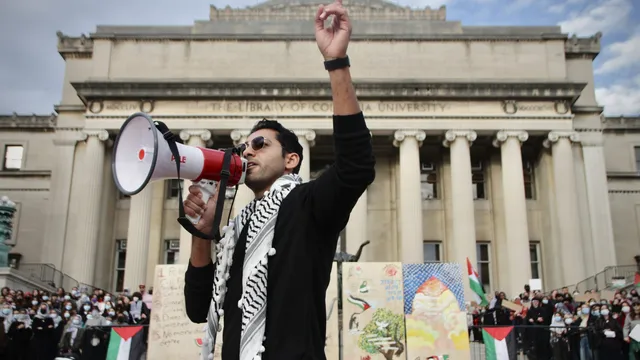
Columbia student Mohsen Mahdawi detained by ICE during citizenship interview
2025-05-09 19:08- Mohsen Mahdawi was arrested during his citizenship interview by ICE agents who disconnected him from his lawyer.
- In 2015, Mahdawi was reported to have made incendiary remarks about Jews and had a background in building weapons for terrorists.
- His case highlights the controversial intersection of immigration policy and free speech, as he continues to fight against deportation.
Express your sentiment!
Insights
In the United States, Mohsen Mahdawi, a Columbia University student originally from the West Bank, was detained by Immigration and Customs Enforcement (ICE) in Vermont. This occurred while he was undergoing a citizenship interview, which he believed might be a 'trap.' Following his arrest, Mahdawi expressed concerns about the state of democracy in the U.S. and worries that he was being targeted by the Trump administration for his political beliefs and activism. His lawyers argued that Mahdawi's situation highlights grave implications for individuals with similar backgrounds, emphasizing the complexities of the immigration system. Mahdawi's detention stirred controversy due to allegations related to his past statements and actions. In interviews and police records from 2015, it was reported that Mahdawi had made troubling comments, including expressing a desire to harm Jewish individuals and boasting about his past work building weapons for terrorists while living in a Palestinian refugee camp. Despite these accusations, Mahdawi maintained that he is a peaceful man and has condemned antisemitism, arguing that his previous comments were taken out of context. The Trump administration has cited Mahdawi’s past activities and statements to justify his deportation, claiming that his presence poses a threat to national security. During his bail hearing, a federal judge referenced the FBI’s decision to close the investigation into Mahdawi as an indication that the allegations against him were unfounded. However, the administration's focus on his vocal activism against Israeli policies raises questions about the motivations behind his detention and the broader implications of political expression in the immigration process. As Mahdawi’s case moves forward, he remains concerned about potential deportation but emphasizes his dedication to justice. He advocates for a peaceful resolution to conflicts in the Middle East and believes his faith has helped ground him during this challenging period. His ongoing struggle reflects the complexities faced by many immigrants involved in political activism and raises critical questions about the intersection of immigration law, national security, and freedom of speech in the United States.
Contexts
The Trump administration's immigration policies were marked by a series of significant changes that aimed to reshape the landscape of immigration in the United States. Prominent among these policies was the emphasis on securing the U.S.-Mexico border, which involved the construction of new border barriers and an increase in personnel and resources dedicated to immigration enforcement. The administration adopted a 'zero-tolerance' policy in 2018, leading to the prosecution of all individuals crossing the border illegally, which in turn resulted in the controversial practice of family separations at the border. This approach was met with widespread criticism and legal challenges, raising ethical questions regarding the treatment of migrants and children. The political implications of these policies were significant, galvanizing both supporters and opponents of stricter immigration measures within the U.S. political landscape. In addition to border enforcement, the Trump administration implemented strict measures on asylum seekers. Policies such as the Migrant Protection Protocols (MPP), commonly referred to as the "Remain in Mexico" policy, required asylum seekers to wait in Mexico for their court hearings in the U.S., often under dangerous conditions. This policy aimed to deter individuals from seeking asylum, fundamentally altering the way the U.S. engaged with international obligations concerning refugees. Furthermore, the administration sought to limit the number of refugees admitted each year, cutting the cap to historic lows and placing additional restrictions on the criteria for acceptance, disproportionately affecting those from specific countries and with particular protected statuses. Another core aspect of Trump's immigration agenda was the attempt to restrict legal immigration pathways. The administration promoted the idea of merit-based immigration, which sought to prioritize high-skilled workers over family reunification and other forms of immigration. This culminated in proposals to eliminate the diversity visa lottery and to reduce family sponsorship options, reshaping the fundamentals of how immigrants could legally enter the country. The administration also focused on enforcement within the U.S. through increased workplace raids and cracking down on sanctuary cities that offered protections to undocumented immigrants. These actions created a climate of fear among immigrant communities and led to significant shifts in local and state-level policies concerning immigration enforcement. Lastly, the Trump administration's approach to immigration was informed by a broader narrative that framed immigrants as a threat to national security and economic stability. This perspective influenced public discourse and policy decisions; it created divisions in political and social spheres. Proponents argued that these policies were necessary for national safety, while opponents highlighted the humanitarian implications and moral responsibilities of the U.S., particularly in light of asylum seekers fleeing violence and persecution. The legacy of these immigration policies continues to shape the conversation surrounding immigration reform, legislative efforts, and the political landscape as the nation moves forward.